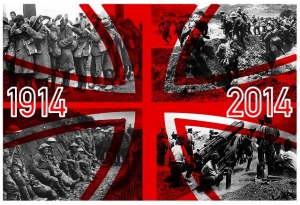In my continuing quest to become educated, I have lately been studying World War I, or The Great War. It is fascinating for so many reasons- it represents the clash of the old world with the modern. Fortress-ruining explosives are being drawn by horse and wagon. People in plumed battle hats are being mowed down by machine guns. The sheer scale of the war is intriguing and horrifying at the same time. For instance, the Civil War Battle of Antietam, often called the ‘bloodiest day in American history,’ had 2,700 deaths and 17,000 wounded. In the first few days of the Great War, France ALONE was showing numbers that dwarfed this: 75,000 dead and 200,000+ wounded. It is a riveting, sickening, dramatic, and tragic time in the history of our world.
Here is what strikes me as odd. In WWI the great powers of the West (and elsewhere, also) lined up against one another in a great and heroic struggle to the death. Men were sent to their deaths in futile charges from the trench again and again, dying because they were ordered to. Carnage scattered across the Western Front as all involved fought tooth and nail to emerge victorious. The cost was great, yet the purpose was not. World War I was fought for no reason.
That may not be a sentiment all of us are familiar with, so I will elaborate. Due to the great evil that swelled up in Germany during the era of World War II, we tend to associate the German military with all wickedness. This, coupled with the fact that the Allies in WWI forced the Germans to take the blame, makes us think of the Great War as a conflict similar to that of WWII: The free nations of the world link arms and stand against the imperialistic, barbaric, expansionist policies of a power-hungry nation-state. Yet when you go back and research the events surrounding the Great War, it becomes clear that this simply isn’t the case.
A “powder keg” is often the term used to describe Europe in the days leading up to the Great War. It is an apt appellation. Everyone was suspicious of each other, each terrified that if there was to be a conflict, they might be the last to mobilize and thus suffer the consequences. World War I was fought not because of competing interests, but because allegiances between nations were already determined, one small spark of an event in Yugoslavia happened, and swords were drawn in response. Once one party was threatened, (Austria-Hungary), its allies took up arms (Germany) and its enemies (Russia, France, UK) took up arms as well. There was still no reason to attack one another, other than preemptive strategy, but everyone involved believed that failure to preempt would mean a lost war- especially Germany. They had good cause to think so, in a way, since they were encircled by nations allied with their enemies, and yet as I read through the long and graphic histories of the horrors of this war, I cannot help but decry the fact that no one was really fighting for anything in particular.
It makes me wonder how we might be doing this sort of thing today- how I might be doing it in my own life. So many of my disputes, I suspect, are like this great and terrible war. Sometimes there isn’t much of a reason for contention, just that fighting is what we do. Allegiances are already determined. If I don’t get my words in first, maybe someone else will, and then where will I be?
Likely, I would be fine, and a “war” would be avoided.
It is a good thing to have a quick draw. It is an even better thing to possess the prudence to know when to use it, and when not to.
“A gentle answer turns away wrath, but a harsh word stirs up anger.” – Proverbs 15:1
